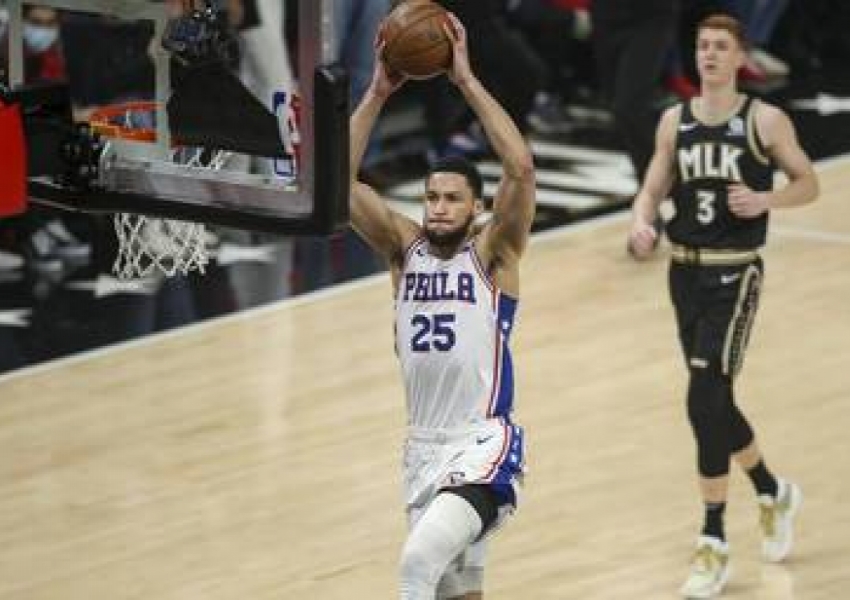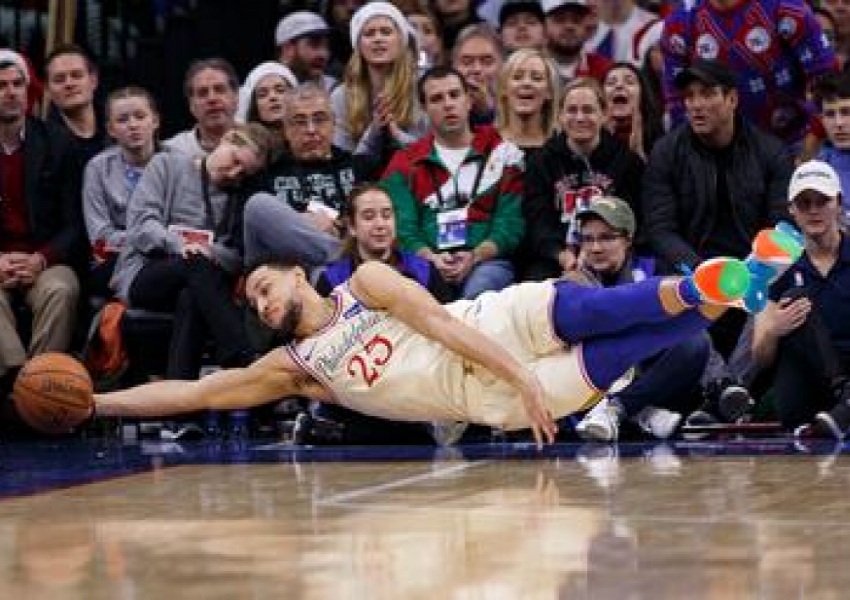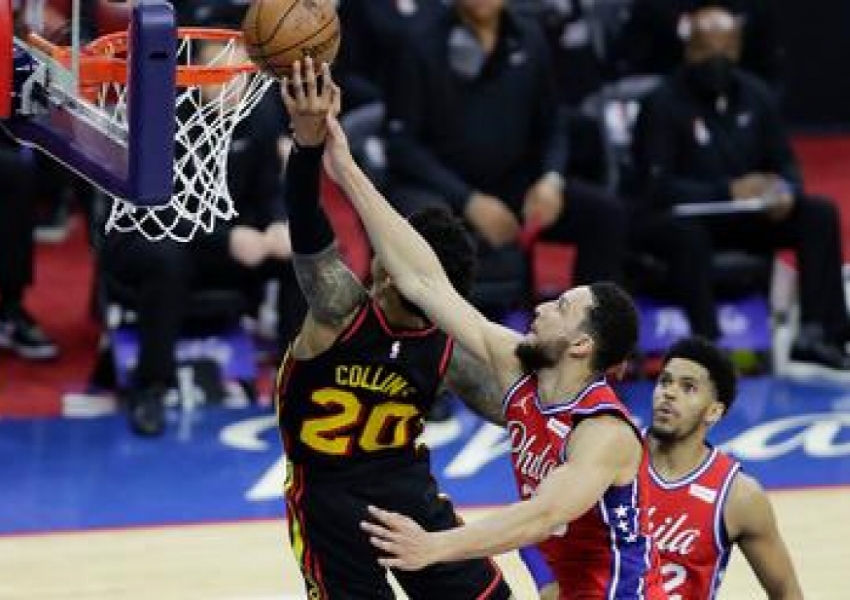28-Year-Old No.1 Pick, $40 Million Salary, Averaging Just 0.8 Points—How Much Longer Will the NBA Tolerate Him?
In the past few seasons, the debate over who holds the title of the NBA’s worst contract has seen numerous names tossed around—Russell Westbrook, John Wall, and others. Yet, in 2025, there seems to be a unanimous consensus: Ben Simmons is the unparalleled example. Once a franchise cornerstone and a multiple-time All-Star, Simmons now finds himself in arguably the worst place a top pick can be: sidelined, disrespected, and massively underperforming relative to his sky-high contract.

This season, Simmons earns a staggering $40 million but has posted embarrassingly low stats, averaging just 5 points, 4.5 rebounds, and 5.6 assists per game during the regular season. His playoff performance has been even more dismal—playing only 8.5 minutes per game, with production plunging to 0.8 points, 1.4 rebounds, and 0.8 assists. At 28 years old, with free agency looming this summer, the big question is: does any NBA team still trust him enough to invest significant minutes or money?

To understand how Simmons spiraled from being a top lottery pick and an All-Star to this near-basketball exile, we have to examine a few key factors: his shooting woes, psychological struggles, physical setbacks, and off-court distractions.

The Shooting Struggle: An Unforgiving Achilles’ Heel
Shooting, or more precisely the absence of it, has been Simmons’ Achilles’ heel from day one. His so-called “shooting fear” has become the defining characteristic of his game. Across his career, Simmons has attempted just 34 three-pointers, making only 5—a pitiful 15% clip. His free throw percentage hovers around 58%, far below NBA standards. These numbers are catastrophic for a modern NBA player, especially for a guard or wing expected to space the floor.
The league has evolved rapidly: from the 2015-16 season to 2022-23, the average number of three-point attempts per game increased by nearly 47%. Almost every position demands a reliable perimeter shot. Take Giannis Antetokounmpo as a contrasting example. Early in his career, Giannis was no shooter either, hovering around 27% from three. But through relentless effort, systematic training, and self-reinvention, Giannis stabilized his three-point shooting around 34%. He also added a formidable post game, making him a near-unstoppable offensive force.
Simmons, however, has resisted or failed to make such adjustments. His midrange game accounts for a mere 3.7% of his shot attempts. Offensively, his presence often turns his team into a four-on-five. The data is damning: when Simmons is on the floor, his team's three-point attempt rate drops by 8.6%, and offensive efficiency falls by 4.2 points per 100 possessions. In today’s NBA, that’s tantamount to tactical poison.
Defense and Passing: The Only Remaining Glimmers
If shooting is Simmons’ kryptonite, his defense and playmaking have been his saving graces. Once known for elite defensive versatility and court vision, those traits have eroded. Still, some argue that his ability to grab rebounds and dish out precise long passes gives him a role as a defensive anchor and secondary facilitator.
But confidence—the fundamental ingredient of success—seems to have deserted Simmons. In Game 7 of the 2021 Eastern Conference semifinals, a glaring moment encapsulated his crisis: faced with an open shot, Simmons passed to a poorly positioned teammate instead of taking the shot himself. The team lost, and Simmons became the scapegoat.
The irony is cruel: Simmons’ style earned him the number one pick, an All-Star nod, and a max contract. Yet, this same style, marred by avoidance and passivity, is now his undoing.
Mental Barriers and the Decline of Drive
Unlike other stars who would confront adversity head-on, Simmons has chosen to retreat. Sports psychologist Jonah Fish has described Simmons as exhibiting a “strong avoidant coping mechanism,” which significantly undermines his training intensity and game readiness.
Former 76ers assistant coach Billy Lange revealed Simmons trains only about 2.5 hours a day—half the volume of his peers—with less than 10% of that dedicated to shooting practice. An internal Brooklyn Nets report highlighted Simmons’ rehabilitation efforts as merely 70% of the team average. This lack of commitment feeds a downward spiral, making his talent irrelevant.
The Physical Toll: Injuries That Sapped His Prime
Injuries have also chipped away at Simmons’ athleticism. In 2020, he suffered a severe lower back nerve impingement. Unlike acute injuries, this chronic issue drew little attention but significantly impacted his physical capabilities.
Simmons was diagnosed with a congenital anomaly between the L4-L5 vertebrae, necessitating surgery. Though he recovered to an extent, his core strength declined, limiting his speed and finishing ability at the rim.
Data reflects this decline starkly: Simmons’ maximum speed has dropped from 6.2 meters per second to 5.4 m/s, while his nerve reflex tests place him in the bottom 15% of the league. This has diminished not only his defensive presence but also his confidence on the court.
The Question of Role and Fit: A Coach’s Nightmare
Without a reliable jumper, diminished athleticism, eroding defense, and a shrinking mental edge, what does Simmons bring to a coach’s playbook? How do you construct an effective offense around a player whose presence reduces spacing and offensive output?
Simmons’ predicament is a conundrum. He lacks the skills to space the floor and the confidence to take crucial shots. He cannot reliably defend at the same level. The “system” simply doesn’t accommodate a player like him anymore. For coaches, Simmons is a tactical liability—a $40 million question mark on how to integrate or limit him.
Off-Court Distractions and Professionalism Concerns
Adding fuel to the fire, Simmons’ focus has arguably shifted away from basketball. With career earnings exceeding $203 million, he has invested in 14 startups spanning various industries. While business savvy is admirable, it’s raised questions about his commitment to basketball.
A particularly telling incident occurred during a playoff game with the 76ers: Simmons reportedly left to attend a grand opening of one of his ventures before the game started, causing friction with teammates and management. His detachment has fueled rumors of poor locker room chemistry and reduced internal communication.
When head coach Doc Rivers and star center Joel Embiid publicly criticized Simmons, many were unaware of the brewing tensions. Simmons’ lack of “professional spirit” has become a consensus concern within his teams.
The Tragic Fall of a Once-Touted Star
Ben Simmons’ downfall is a perfect storm of flawed skills, mental hurdles, injuries, and questionable priorities. He is a player caught in the brutal crossfire of the NBA’s evolution and personal demons.
The league’s revolution toward perimeter shooting and pace has left Simmons behind, and his inability—or unwillingness—to adapt has sealed his fate. His self-doubt has eroded the very confidence that once made him a top pick. Injuries have robbed him of his prime athleticism. And his distracted focus off the court has alienated him from teammates and coaching staff.
Once a heralded talent with a bright future, Simmons now embodies the harsh reality of professional sports: talent alone isn’t enough. Continuous growth, mental toughness, and professionalism are the keys to longevity. When those falter, even a former No.1 pick with a $40 million paycheck can become a cautionary tale.
A Final Take: When Talent Meets Reality
In the unforgiving world of the NBA, contracts are as much a gamble as they are a reward. Ben Simmons’ journey stands as a stark reminder that the game isn’t just about physical gifts—it’s about mental fortitude, adaptability, and relentless work ethic.
At 28, Simmons sits at a crossroads. Will he reinvent himself like Giannis or fade into the background of league history? The NBA’s tolerance for underperformance is finite, especially at his price tag. Teams might hesitate to take on his contract or gamble on a turnaround.
But perhaps the most important lesson Simmons’ story offers is that talent is merely the beginning. Without confidence, without commitment, and without the ability to evolve, even the brightest stars can dim—and fast.
The question remains: how much longer will the NBA let Simmons hold a roster spot, let alone a max contract? And perhaps more poignantly—how much longer will he hold onto the confidence and drive needed to rewrite his narrative?
If you ask me, the tale of Ben Simmons isn’t just about basketball. It’s a microcosm of ambition, pressure, and the brutal consequences of unmet potential in the world’s most demanding sport. And for every Simmons, there’s a reminder: in the NBA, the glory of youth means nothing without the hunger to sustain it.
Copyright Statement:
Author: focusnba
Source: FocusNBA
The copyright of this article belongs to the author. Reproduction is not allowed without permission.
Recommended Blog
- Rare Rotation Brings Redemption: How Thibodeau's Nine-Man Strategy Powered the Knicks to a Critical Game 3 Win
- One More Year? At Nearly 39, What Does Al Horford Really Have Left in the Tank?
- Six-for-One: Did the 2022 Celtics-Pacers Trade Turn Out to Be a True Win-Win?
- Plus-Minus Disaster: What Went Wrong for Karl-Anthony Towns in Game 2?
- From Golden Promise to Global Wanderer: The Rise and Fall of Omari Spellman, the Warriors’ Small-Ball Prototype
- The Price of Greatness: What Three First-Round Picks Got the Pacers in Pascal Siakam
- Outplayed and Outgunned: Anthony Edwards Struggles to Match SGA’s Greatness in the Western Conference Finals
- $30 Million a Year? Is 24-Year-Old Braun Worth the Price Tag?
- Born for the Big Stage: How Immanuel Quickley Has Become a Playoff Powerhouse in 2025
- Jaw-Dropping Comebacks and Masterful Coaching: How Nate McMillan’s Pacers Are Redefining Playoff Resilience in 2025